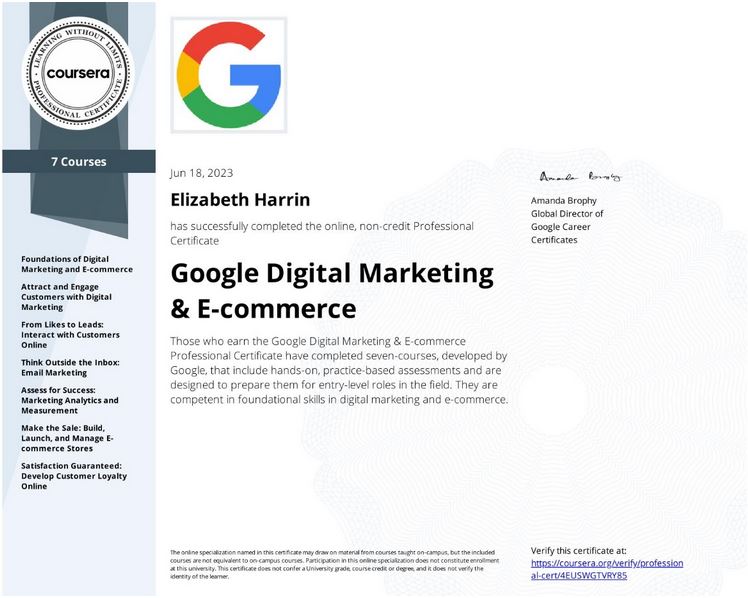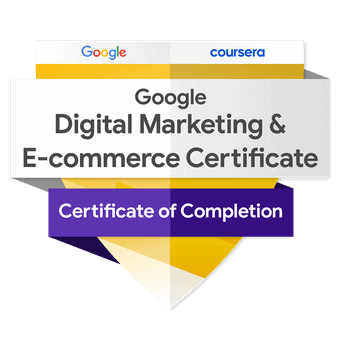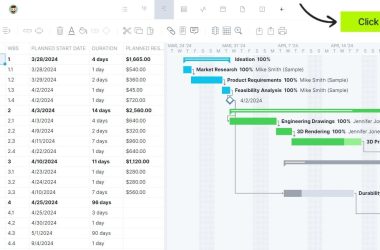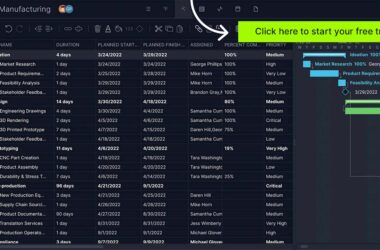The
While I’m not a full-time digital marketer, I run a blog and manage my own online presence as an author so I know the value of this certificate firsthand. So outside of my project management day job I do have a reason to brush up on digital marketing and e-commerce best practices.
I’ve spoken to some people about my experiences doing the courses and the question I get asked the most is: “Is the certificate enough to land a job?” In other words, is it worth it?
Key things to know
- The Google Digital Marketing & E-commerce certificate can help you get an entry-level job.
- Experience is also going to help you get a job, so figure out how to get some if you don’t have any already! (Ideas below)

What the Google Digital Marketing Certificate covers
The certificate is made up of 7 courses. These are:
- Foundations of digital marketing and e-commerce
- Attract and engage customers with digital marketing
- From likes to leads: interact with customers online
- Think outside the inbox: email marketing
- Assess for success: Marketing analytics and measurement (don’t miss this one!)
- Make the sale: Build, launch and manage e-commerce stores
- Satisfaction guaranteed: develop customer loyalty online
You don’t have to take them in order, but it makes sense to do so as they build as you go through.
You do have to take them all (and pass them all) to be awarded the certificate.

Skills covered
There is a lot of focus on
You’ll learn topics like:
- SEO & SEM
- Email marketing
- Google Ads
- Shopify basics
- Social media engagement
If those terms mean nothing to you, they are common
These skills are going to equip you for digital marketing entry-level jobs.
Entry-level jobs you can apply for
Here are some jobs you can go for, if you aren’t going to use the certificate as training for your side-hustle like I did.
| Job Title | Typical Salary (UK/US) | Notes |
| Digital Marketing Assistant | £22–30k / $40–55k | Generalist starter role |
| Social Media Coordinator | £25–35k / $45–60k | Focus on content and engagement |
| SEO/SEM Associate | £28–38k / $50–70k | Strong demand for analytical skills |
| Email Marketing Assistant | £26–34k / $45–65k | CRM and campaign management |
| eCommerce Associate | £25–32k / $45–60k | Shopify, product listings |
These are some of the best jobs after the Coursera certificate, but of course look for other relevant job titles and industries that appeal to your interests.
Can you get a job with the Google Digital Marketing certificate?
Yes. Many learners go on to entry-level roles like Digital Marketing Assistant, SEO Associate, or Email Marketer.
I personally didn’t try for this, but I know others have been successful and that
However, if you want to work specificially with Facebook ads or Instagram influencers, you’d be better off with the Meta Social Media Marketing Professional Certificate.
Or do both, because then you’ll have a rounded skill set to share with employers!
Both the Meta and
How to boost your job readiness
If you’re exploring
When you go for an interview, you’re going to want to be as ready as possible with a portfolio of evidence to talk about.
Here are some digital marketing job readiness tips!
- Complete all the assignments, even if they’re not required (I didn’t do this because I wasn’t going for a digital marketing job)
- Build a sample campaign (blog, newsletter, social posts for yourself or a friend’s business)
- Use Canva, Mailchimp, Hubspot, etc. for real-life tools – many free options available
- Create a portfolio site (even on Notion or Wix) so you can share examples of your work.
There’s also a new course in the professional certification which wasn’t available when I took the training: AI for your job search. It’s an optional course, so it won’t affect whether you earn the certificate or not, but it’s great for learning about how to use Gemini and Notebook LM to manage your job search, prep for interview, and polish your CV or resume.
Tips from employers
I asked employers what they thought about how candidates can boost their employability and make their application stand out. Here are a few of the tips they shared.
“I pay more attention to them when the candidate effectively shows how they play a part in their overall career narrative, like if they took the course while also managing a specific project in a prior role, showing that they can apply the knowledge effectively in a real-world context,” said Matt Erhard, Managing Partner at Summit Search Group in Canada.

Pair certificates with experience
Candidates who can demonstrate real experience leading teams and taking ownership of projects will always stand out the strongest.
Matt Erhard, Managing Partner, Summit Search Group
“For roles in digital marketing, the certificates are also making an impression,” says Deepak Shukla, CEO of Pearl Lemon Placements. “Hiring managers are beginning to recognize these qualifications as evidence of job readiness, especially when paired with real-world project samples or freelance work.”
He went on to add, “We often advise candidates to treat the certificates as a launchpad, not a guarantee, and to supplement them with measurable outcomes from any hands-on experience they can get.”

Certificates are a launchpad
Recruiters do take note when these certificates are listed on LinkedIn, especially if they’re paired with clear personal branding and relevant results.
Deepak Shukla, CEO of Pearl Lemon Placements
Read more about what employers have to say about
LinkedIn and resume/CV tips
Employers are going to check out your LinkedIn profile so make sure it shines!
- Add your Credly badge so employers can verify your achievement
- Use keywords from the certificate in your headline and summary (like “Digital Marketing” and “Google-certified”)
- Post regular updates about your learning journey as posts or articles on LinkedIn
- Follow companies in the
Google Career Certificates employer consortium.
That last point is important because the employer consortium companies actively hire
Other tools that help
Finishing your certification is only the beginning. Here are some other things that will help you get that job.
Join communities. Check out r/marketing, LinkedIn groups, Slack channels and find your people. One of them might have job offers in the future.
Volunteer to run marketing for a small business or nonprofit. That could be your child’s school’s parent teacher organization – it doesn’t have to be a big commitment.
Keep learning. Watch YouTube videos, go to conferences, read newsletters, and follow content creators.
Keep practicing with the tools. Get proficient at using common tools like Canva and other image creators, AI tools, email marketing tools, and so on. Your future employer may not use those tools, but once you know how one email marketing product works, you can quickly figure out another.

Your next steps
In summary, yes, you can get a job with the certificate, but the certificate + experience is going to be your best bet for landing a well-paid entry-level post.
Keep learning, practicing, and applying your skills! You’re on the right track!
This article first appeared on Rebel’s Guide to Project Management and can be read here: What Jobs Can You Get with the Google Digital Marketing Certificate in 2025?






